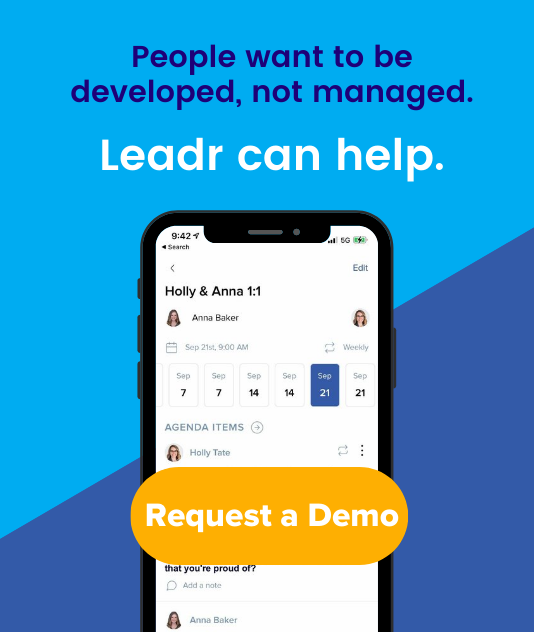Did You Know That Anyone Can Be A Leader? That's A Good Thing and Here's Why.
The concept of a leadership role evokes an image of a person in charge. They are the one with the plan, giving directions to those they work with. But this is more the image of a manager, not a leader.
Managers are often chosen for their technical knowledge or relevant skill set. They tend to assign duties and stick to established rules and routines for success. Leaders, on the other hand, often emerge from within a team. They are the individual that people naturally want to follow because they encourage and inspire those around them to be a part of something bigger.
While being a manager typically means that you have a title that puts you in charge, anyone can be a leader. With the right focus, you can develop the leadership traits that will make you a leader that others naturally want to follow.
1. It’s about the mindset, not the skill set
In the past, having the best working knowledge of your department and being able to give direction would put you in line for a promotion into leadership. But, as the workplace has evolved, so too has the criteria for becoming a good leader.
In the modern workplace, being a leader is less about the technical skills that you possess and more about the mindset that you bring to your team. A leadership mindset sets the tone for how you present yourself to others, carry out your responsibilities, and develop relationships within your organization.
The leadership mindset is defined by several key characteristics:
- A willingness to face challenges and see them as opportunities
- Humility to acknowledge your shortcomings and value the contributions of others
- A growth mentality that is open to new ideas and approaches
- Decisiveness to make a decision and stick to it
- Openness and honesty to foster positive relationships with those on your team
- Interest in others’ success so that you can celebrate their achievements and help them overcome their shortcomings
- Acceptance of responsibility when something goes wrong
Developing a leadership mindset is within reach of anyone who cares for the members of their team, approaches their work with enthusiasm, and keeps a level-head in every circumstance.
2. Everything you need to know, you can learn on the job
Many people believe that their lack of knowledge disqualifies them from leadership roles. The truth is that nearly 70% of the knowledge that is needed to complete a job can be learned while you are already in that role.
Most organizations have the resources you need to gain the necessary skills to complete the job. As you talk to colleagues about your experiences, they can share tips that they have learned that helped them to become more effective. As you carry out the responsibilities of your role, you will naturally learn what works and what doesn’t. As time goes by, there will be formal training and professional development opportunities that will supply the technical skills that you may feel you’re lacking. What they can’t teach you are the leadership skills, attitudes, and characteristics that make for successful leaders.
3. Never stop developing your weaknesses
Weaknesses fall into two categories: inexperience and innate.
When you first assume a new role, a lack of knowledge can cause you to feel like you’re not fit for the job. This is a weakness due to inexperience. If you work at it, this weakness doesn’t have to last. Learning from your mistakes, reflecting on the results you achieve, and accepting constructive feedback can help you to overcome these weaknesses.
Other weaknesses are based on your personality. These are innate weaknesses. Identifying these shortcomings requires you to be honest about the things that make you feel insecure or disappointed about your performance. Overcoming these weaknesses involves creating a plan and setting realistic goals that help you to develop.
As a leader, you become a model for those on your team. When they know that you are honest about your weaknesses and they watch you purposefully work to overcome them, you set an important precedent. You send the message that it’s okay to have areas of weakness, but it’s not acceptable to let them become an excuse.
4. Leadership is learned from other great leaders
If you want to get better at something, find someone who is better at it than you. Leadership is no different.
Finding someone to mentor you, as you become a leader, can lend you the benefit of their experience. They will help you to evaluate your leadership practices and push you to define and work towards the vision of leadership that you have for yourself.
As you work with a mentor who develops you, you, in turn, learn leadership skills that will help you to develop and coach others on your team.
The truth is, if you can demonstrate leadership in a small role, then you can be a leader in any role with more responsibility. Knowing how to lead a team can help you to lead a department, division, or organization.
At Leadr we have the tools that will help you to develop leaders within your organization. Our people development software will help you set consistent 1:1 meetings, clear goals, and give regular feedback that can guide anyone within your organization to becoming an effective leader.
Do you believe that you are a leader? Why or why not? Let us know in the comments below!
Share this
You May Also Like
These Related Stories

Empathy: The Number One Skill For Leaders

Your Team’s Not Just There to Work. They’re There to Grow.






No Comments Yet
Let us know what you think